Description
This bundle contains 1 pound each of:
Colombian Cauca Manos Juntas Micromill – Castillo Natural Processed
A very fruit forward and floral cup of coffee! A stellar example if you like the slow dried natural process. Although it is a Colombian coffee this is not for you traditional Colombian fans. Very unique tastes in this offering. If you enjoy coffees like Ethiopian Naturals, Indo Bali Kintamani, Zambia Natural, this will be right down your alley. One will see pretty two-toned roasting with it and very fruit forward winy/floral/fruity tones.
Manos Juntas is a micromill in Sotara area of Colombia’s Cauca region, operated and managed by Banexport. The entire concept of this micromill is based on simplifying tasks and responsibilities, for both producers and export companies.
This particular offering was first purchased in its cherry form when delivered to the mill by eight local producers, on the day of harvest. Upon arrival, the Brix and pH were recorded, and the cherries were placed in large hermetic tanks for a five-day-long anaerobic fermentation. After this, the cherries were taken to raised beds under a parabolic dryer to begin their 30-day process of slowly drying.
Processing coffee is half the battle for small scale farmers, which is why Banexport decided to establish Manos Juntas Micromill, in which they purchase cherries from producers and manage the processing, drying, and storage themselves. This model allows producers to focus on healthy production of specialty coffee, while the meticulous work of sorting, processing, drying, and storing is managed by Banexport’s team.
Altitude: 1950 – 2100 masl
Varieties: Castillo, Colombia, F6
Tasting Notes: All sorts of cool unique flavors can be found in this cup. The brighter tones tend to range from a lemon citric component at the lighter roasts to more of a stone fruit in the medium roast range. The acidity is pretty high at the lighter roasts but mellows greatly at a strong medium to dark roast. The balance of the cup comes from an almost cola-like tone that turns a bit nuttier into the darker roasts. Medium bodied, super clean with some far from traditional Colombian tones.
Roasting Notes: A great cup at most roast levels. Avoid extreme light or dark roasts, it can be a little too bright at very light roasts and a little too bitter at super dark roasts but is a tasty treat anywhere in between. High chaff and uneven roasting. Make sure everything is through first crack before cooling. If in doubt, look for the first pop of 2nd crack and hit cool, this will ensure that everything is through first crack and will give a nice rich cup.
Costa Rican Las Lajas Micromill – Finca Calle Liles – “Alma Negra” (Black Soul) Natural
Oscar and Francisca Chacón are third-generation coffee producers, but the coffee is more than just in their family heritage: It’s in their hearts and souls as well. The couple is committed to quality and innovation, and are among the very first farmers in Costa Rica to produce Honey and Natural process specialty coffee.
In 2005, after years of delivering their cherry to a cooperative for the going market price, they decided to join the brand-new “micromill revolution” and buy their own depulper to have more control over the quality and the price they received for their lots. “At first, we didn’t know what we were doing,” Oscar explains. “We were just experimenting.” That experimentation led to some of the most exciting new flavor profiles we have ever tasted: Now, the Chacons produce a wide range of Honey process coffees, modulating the drying time in order to create different effects in the cup.
Necessity bred more innovation for the family when an earthquake in 2008 wiped out electricity and water to their area during the harvest. Unable to run the depulpers or to wash the mucilage off to produce Washed lots, Francisca took inspiration from her knowledge of African coffee production and quickly built raised beds on the property.
Tasting Notes: A stellar fruit forward cup of coffee. Similar to the Black Pearl Processing but a little stronger and more wild in its fruity factor. Super clean, medium bodied with some decent acidity. Lighter roasts are a bit higher acidity giving some great sweetness and a stronger winy grape and red fruit tone balanced with a more malty dark tone, a coffee version of jellied toast. Medium roasts reduce some of the wild fruity aspects of the cup along with reducing the more acidic notes, but build much more of a malty chocolaty tone. The cup retains a more refined tart red fruit note (think cranberry) up until 2nd crack.
Roasting Notes: High chaff and will roast slightly two toned, the cup is well worth the challenge for you Natural process fans. Great at the lighter roast points but holds up nicely at any roast before the 2nd crack. Not a dark roast candidate.
A glowing example of coffee’s potential in Costa Rica is Finca Calle Lilies in Poas de Alajuela; in the mountains to the north of the country’s capital of San Jose. As little as six years ago there was nothing where Las Lajas now produces exceptional micro-lots. “We’re a family of six siblings, including myself. We wanted a family business that would do just that; keep business in the family. We set out to create jobs for each other and now we almost have more work than we can handle!” – Donna Chacon
Las Lajas’ reputation for quality precedes it; the care with which the Chacon family manages their mill and processing has put their Honey and Natural coffees in steep demand. Doña Francisca proudly showcased the Red and Yellow Honeys – their two favorite lots drying on African beds and the different methods for drying Naturals, some of which are dried in deep layers under plastic and others that are dried on stacked beds. Doña Francisca’s husband, Don Oscar, puts it this way: “We play with processing curves the same way roasters play with roast curves: adjusting the variables of time and temperature to see what characteristics appear in the cup.”
This curiosity and willingness to experiment and find a new level of excellence is apparent in the final product: explosively fruity coffees with complex acidity and a bright finish.
Dominican Org Ramirez Estate – Natural Processed
A very cool single estate coffee from Cafe Kreyol (our Haitian Co-op friends).
Cafe Kreyol goes into some of the most impoverished and troubled areas that are within prime coffee growing territory, organizes farmers, teaches how to correctly process beans, guarantees purchase of the beans at way above market prices ensuring it goes directly to the farmers and strives to really turn around some of the more troubled areas, putting people to work at well above average wages and ensuring future livelihoods.
Joey, the head of Cafe Kreyol, even strives for his US employees the above statement. He finds the hardest working individuals with great work ethics that for one reason or another have really been put down with employment and troubled times to help them recover and build a resume while also being able to help others.
One can feel really good about supporting any of Cafe Kreyol’s projects and for the most part – really tasty coffees as well.
Cafe Kreyol projects including this one are project coffees (although this is the nicest screen out of the lot), these are not a 0 defect beautiful large screen coffee. It takes around 5-7 years to really turn out a prime coffee operation and most of these are on year 2-3. Great tasting cups but keep in mind – not the worlds best screen.
In 1943, Mr. Belarminio Ramirez started a small company dedicated to the cultivation and marketing of coffee, which over the years grows into a family tradition involves three generations already. The Belarminio Ramirez Group was named in his honor.
Currently, the company owns 350 hectares of coffee production, located in the mountains of the central range between 800 and 1500 meters above sea.
Tasting Notes:
A very cool, very exotic cup of coffee. One can tell this is a slow dry natural processed coffee with its strong ripe red fruit tones upfront. Lighter roasting presents a ton of floral and fruit with an almost oak/peat boozy finish, very sweet with just a ton going on but does risk some underdeveloped tones with its two-toned roasting. Medium roasts were our favorite, still plenty wild but develop enough of the chocolate and smoky tones – which most Dominican coffees are known for – to balance all those more exotic fruity and citric tones. Darker roasts will burn out most of what distinguishes this cup, the washed processed handles those roast level much better; interesting and still exotic but strong and edgy, it will retain some fruity factor with very strong and less sweet, smoky, tobacco and bakers chocolate type notes.
Roasting Notes:
Will roast a bit two toned, so make sure everything makes it through first crack before cooling. Slower roasting (at lower temps) and/or slightly reducing batch size may help if having issues, worth the work for you fruit forward coffee fans. Make sure to play around with the roast on this bean, light to as dark as you want to go will really change it up. Has some good lighter roast attributes for those who don’t mind a little acidity. Higher chaff.

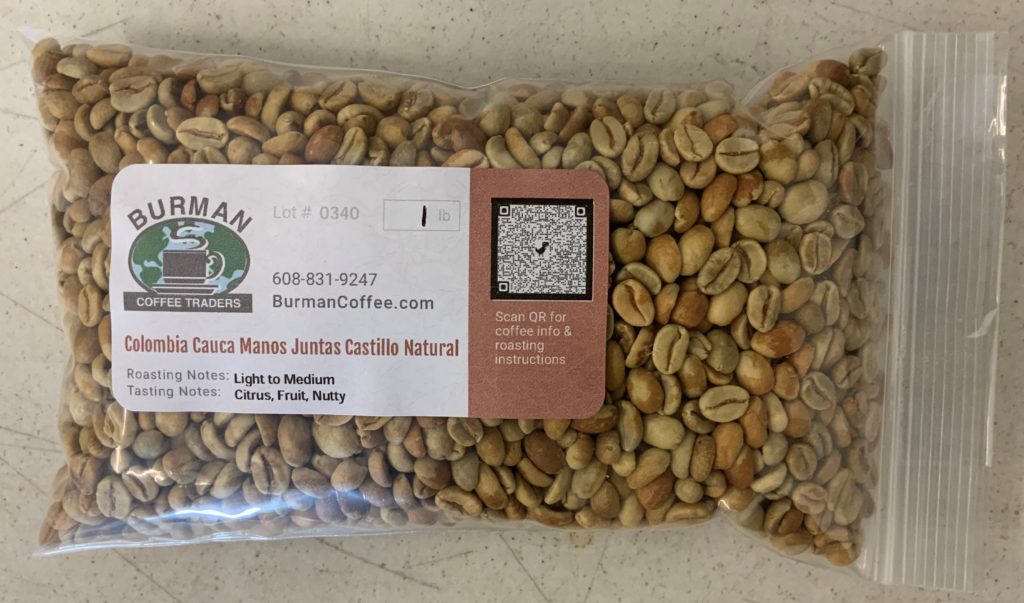
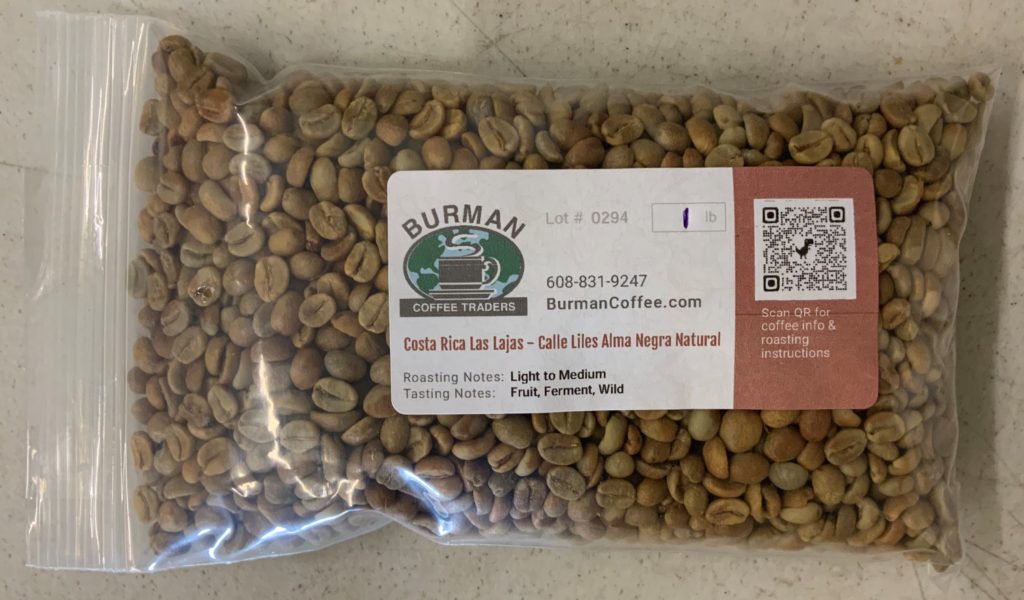

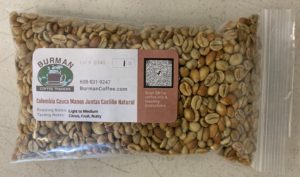
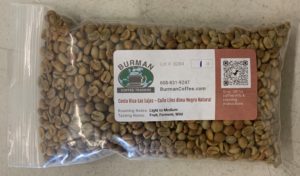
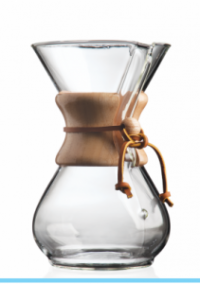


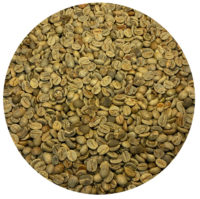

Reviews
There are no reviews yet.